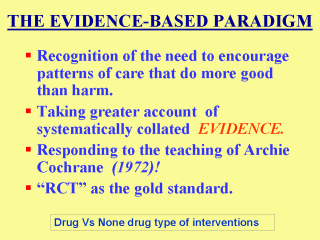|
|
|
|
front |1 |2 |3 |4 |5 |6 |7 |8 |9 |10 |11 |12 |13 |14 |15 |16 |17 |18 |19 |20 |review |
 |
What is Evidence-Based Medicine (EBM)? The standard definition of EBM is the conscientious, explicit judicious use of current best available evidence in making decisions about the care of individual patients. The practice of EBM calls for the integration of individual clinical expertise with the best available external evidence from systematic research. Individual clinical expertise is the proficiency and judgment that individual clinicians acquire through clinical experience and clinical practice which usually is reflected on effective and efficient diagnosis, thoughtful identification and compassionate dealing with individual patientsí predicaments, rights and preferences. On the other hand, the best available external evidence is derived from CLINICALLY RELEVANT research from basic sciences, patient centered clinical research into accuracy and precision of diagnostic tests (including physical examination), the power of prognostic markers, efficacy and safety of therapeutic, rehabilitative and preventive regimens. So, individual clinical expertise is crucial for the practice of EBM. If the clinician lacks the expertise, no matter how good an evidence is, the application of such evidence will be misdirected. By the same token, no matter how excellent is the clinical expertise, in the absence of best available external evidence from clinically relevant research, will continue to reflect the authoritarian approach to teaching and practicing of medicine. The Evidence-Based paradigm is based on the following: 1. Recognition of the need to encourage patterns of care that do more good than harm. 2. Taking greater account of systematically collated evidence. 3. The practice of Evidence Based Medicine, which is increasingly being adopted, is responding to the teaching of Archie Cochrane, who is a physician who was among the first people to call for the adoption of evidence based practice. 4. Whenever possible, randomized controlled trials should be sought as the gold standard for evidence. While, for years, any new drug intervention before it is licensed for use on people, it has to undergo a very strict and rigorous scientific assessment, usually in the form of randomized controlled trials, while non-drug type of intervention is not subjected to similar scrutiny which is completely irrational. |